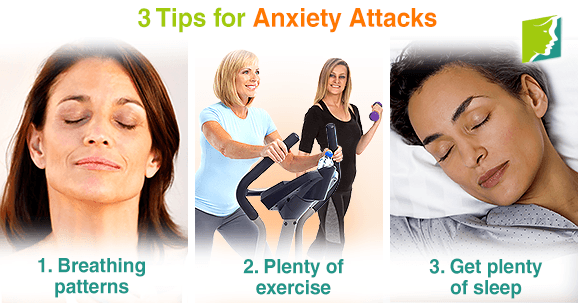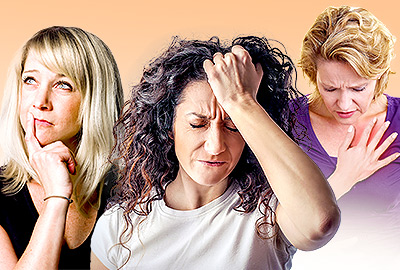Feeling anxious when an imminent threat is present in order to react appropriately is what has allowed the human species to survive, but some people have too much anxiety or their anxiety is counterproductive. This means people can experience substantial anxiety even without any evident perils - this is a clinical condition. The causes of anxiety often involve a range of psychological, genetic, and environmental factors, and symptoms can include feeling detached from reality, excessive sweating, and anxiety attacks. Read on to find out more about anxiety attacks and how to stop them.
What Are Anxiety Attacks?
An anxiety attack is when a person feels intense panic, and symptoms can often mimic a heart attack or breathing disorder. Such symptoms include a rapid heartbeat, chest pains, the need to escape, and an overwhelming sense of impending disaster.
Breathing patterns
The natural temptation during an anxiety attack is either to breathe too fast (hyperventilation) or too deeply. Rapid breathing results in the body taking in too much oxygen and removing too much carbon dioxide, upsetting the balance needed by the body in order to function properly. When an anxiety attack threatens to occur, the best thing to do is slow your breathing, but keep it at a constant level. Deep breathing exercises every day can also help reduce stress levels and make anxiety less severe.
Plenty of exercise
Exercise releases endorphins - mood-regulating neurotransmitters - in the brain, and this results in a better mood, reducing anxiety. Incorporating regular physical movement into your life will be a long-term preventative measure, but it can also work in the short-term. Responding to an impending anxiety attack with a short burst of physical exertion, such as running, should prevent it from taking hold. It is recommended that all adults do at least 30 minutes of exercise per day for overall health.
Get plenty of sleep
Insomnia can often be a result of anxiety, and so getting more sleep can be a hard habit to create. However, fatigue can often exacerbate irrational thoughts, which worsen anxiety. Drinking an herbal tea before bed or taking other measures to relax before bed can help. It is also important to avoid caffeine and alcohol, especially before bedtime, and make your bedroom into an ideal sleeping environment by keeping it cool, dark, and quiet.
Anxiety can strike at any time and can be overwhelming, emotionally draining, and stressful. Learning how to manage anxiety attacks takes practice, but it can be done. If they are still extreme even with the lifestyle changes, medical advice should be sought, but any treatment should go alongside a healthy lifestyle.
Sources
- Anxiety and Depression Association of America. (2014). Facts & Statistics. Retrieved August 15, 2014, from http://www.adaa.org/about-adaa/press-room/facts-statistics
- Anxiety UK. (n.d). Guide to herbal medicines. Retrieved August 15, 2014, from https://www.anxietyuk.org.uk/get-help/get-help-3/guide-to-herbal-medicine
- Anxiety UK. (n.d). Physical exercise & anxiety. Retrieved August 15, 2014, from https://www.anxietyuk.org.uk/get-help/get-help-3/physical-exercise-and-anxiety
- Harvard Gazette (n.d.). Estrogen and female anxiety. Retrieved August 15, 2014, from http://news.harvard.edu/gazette/story/2012/08/estrogen-and-female-anxiety/
- National Health Service UK. (2014). How to get to sleep. Retrieved August 15, 2014, from http://www.nhs.uk/Livewell/insomnia/Pages/bedtimeritual.aspx
- National Health Service UK. (2013). Self-help tips to fight fatigue. Retrieved August 15, 2014, from http://www.nhs.uk/livewell/tiredness-and-fatigue/pages/self-help-energy-tips.aspx
- National Health Service UK. (2013). Stress, Anxiety, and Depression: Why do I feel panicky? Retrieved August 15, 2014, from http://www.nhs.uk/Conditions/stress-anxiety-depression/Pages/understanding-panic.aspx




